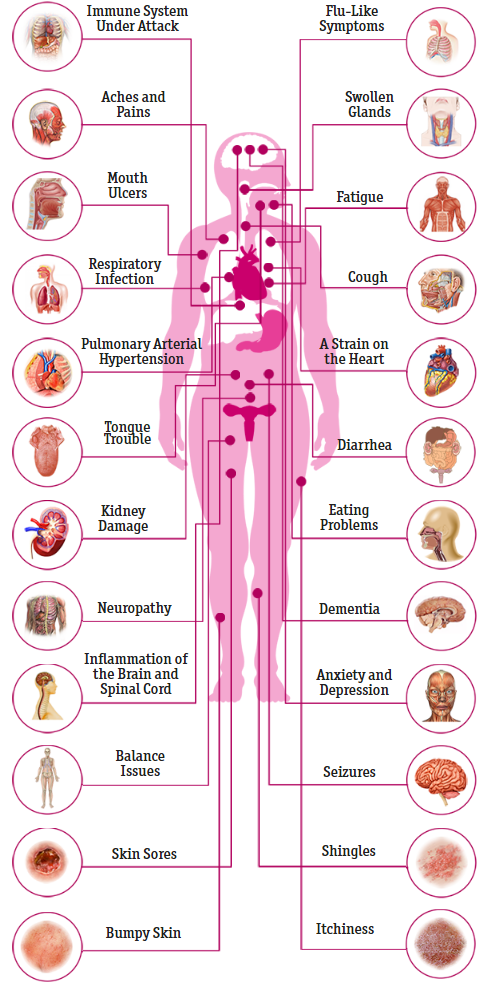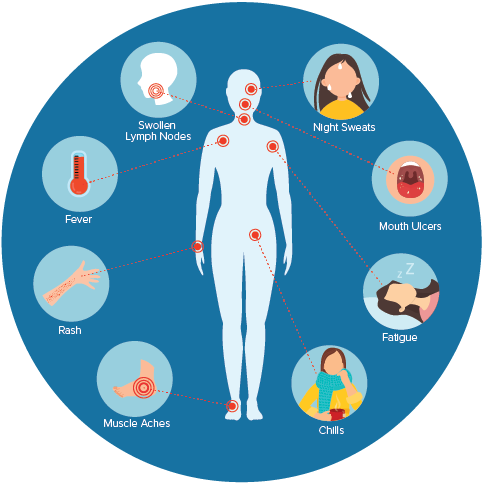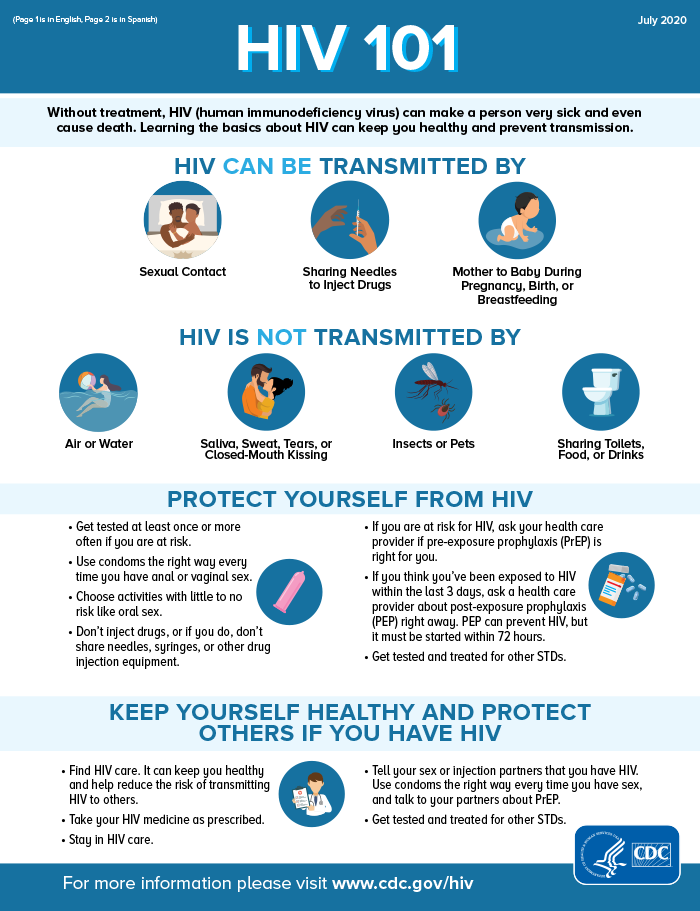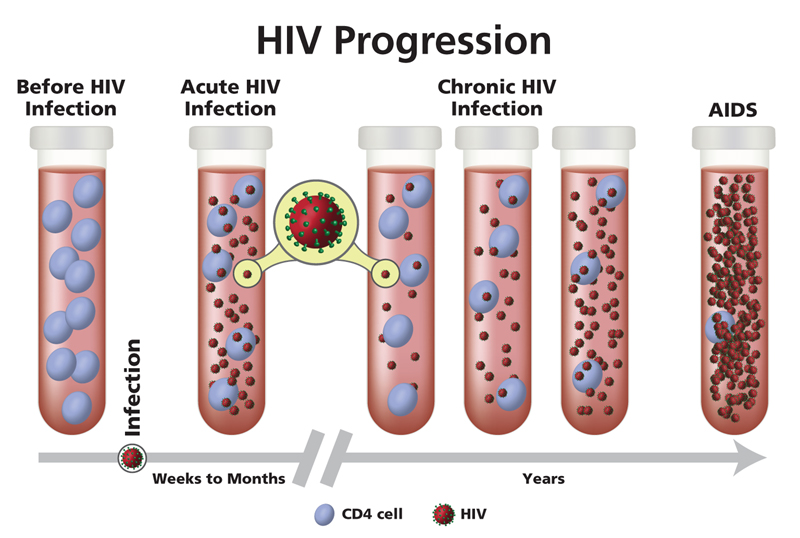The HIV lifecycle HIV infects a type of white blood cell in the bodys immune system called a T-helper cell also called a CD4 cell. As a result the level of HIV in the blood and the chances of transmission at this stage are very high.
 A Timeline Of Hiv Symptoms How Does It Progress
A Timeline Of Hiv Symptoms How Does It Progress
The normal CD4 cell count ranges from between 500 and 1000.
How does hiv progress in your body. This damage means that over time the body. HIV is most commonly transmitted through having sex without a condom or drug use via sharing needles. HIV is a virus that gradually weakens the immune system.
HIV is most commonly transmitted through having sex without a condom or drug use via sharing needles. This is when the immune defenses have been compromised and the body is less able to defend itself against potentially life-threatening infections. In the acute stage of infection HIV multiplies rapidly and spreads throughout the body.
Without antiretroviral treatment for HIV the virus replicates in the body and causes more and more damage to the immune system. If HIV is not treated it can lead to AIDS acquired immunodeficiency syndrome. It tells the other cells what they need to do to rid the body of an.
Lower amount of CD4 cells in the body makes your body more susceptible to diseases. HIV is transmitted through contact with bodily fluids such as blood semen including pre-cum vaginal fluid anal secretions and breast milk. Its known as the CD4 helper cell or T cell.
After HIV enters the body it hunts down and penetrates the CD4 cell which functions as the immune systems quarterback. You can also download materials to share or watch videos on basic information about HIV. Theres currently no cure for it but there are treatments available to reduce its effects on peoples lives.
In the initial stage the virus multiplies rapidly and spreads throughout the body. In someone with a healthy immune system CD4 counts are between 500 and 1600 cellsmm3. If you have HIV and you are not on HIV treatment eventually your bodys immune system will weaken and you will progress to AIDS.
HIV is a virus spread through certain body fluids that attacks the bodys immune system specifically the CD4 cells often called T cells. It targets and destroys the CD4 cells the infection-fighting cells of the body. Approximate time for CD4 count to drop to 200 cellsmm 3 without ART.
HIV cannot replicate on its own. However with effective treatment you can keep the virus under control and stop it from progressing. As the disease progresses new symptoms begin to appear and quickly worsen.
When HIV destroys this cell it becomes harder for the body to fight off other. HIV cannot reproduce on its own. HIV cannot replicate on its own.
Over time HIV can destroy so many of these cells that the bo. Without treatment it progresses over time through three stages. There is no test to know how quickly HIV will progress other than by monitoring the CD4 count over time.
In all but a few rare cases if left untreated HIV will progress to a stage of infection called AIDS. The timing depends on many factors including medications age and overall. HIV is a viral infection.
In the majority of cases once HIV. The number of their CD4 cells falls below 200 cells per cubic millimeter of blood 200 cellsmm3. Learning the basics about HIV can keep you healthy and prevent HIV transmission.
Understanding HIV and AIDS. HIV is transmitted through contact with bodily fluids such as blood semen including pre-cum vaginal fluid anal secretions and breast milk. People who progress more quickly get as good a response to treatment as people who progress more slowly.
During the acute HIV infection stage the level of HIV in the blood is very high which greatly increases the risk of HIV. HIV attacks a specific type of immune system cell in the body. The virus attacks and destroys the infection-fighting CD4 cells of the immune system.
25 people would take 1-2 years and fast progressors. It targets and gradually weakens the bodys immune system by damaging cells called CD4 T cells. HIV is a virus that compromises the immune system.
People with AIDS have such badly damaged immune systems that they get a number of severe illnesses called opportunistic infections. The stages below describe how HIV infection progresses in the body if it is left untreated. When the bodys viral load a measurement of how many cells in the blood are infected with HIV begins rising to higher and higher levels this indicates the immune system is deteriorating.
A person with HIV is considered to have progressed to AIDS when. These vital cells keep us healthy by fighting off infections and diseases. HIV human immunodeficiency virus is a virus that attacks the bodys immune system.
Symptomatic HIV Infection Over time the infection advances. The HIV virus destroys CD4 cells that work to fight off infections in the body.
 Human Immunodeficiency Virus Hiv Infection Infections Merck Manuals Consumer Version
Human Immunodeficiency Virus Hiv Infection Infections Merck Manuals Consumer Version
 What Are The Important Effects Of Hiv On The Body
What Are The Important Effects Of Hiv On The Body
 About Hiv Aids Hiv Basics Hiv Aids Cdc
About Hiv Aids Hiv Basics Hiv Aids Cdc

Https Www Naadac Org Assets 2416 Naadac Hiv Overview Webinar 1013 Ppt With Notes Pdf
 The Science Of Hiv And Aids Overview Avert
The Science Of Hiv And Aids Overview Avert
 Hiv Signs And Symptoms In Women
Hiv Signs And Symptoms In Women
 The Effects Of Hiv On The Body Immune System And More
The Effects Of Hiv On The Body Immune System And More
 About Hiv Aids Hiv Basics Hiv Aids Cdc
About Hiv Aids Hiv Basics Hiv Aids Cdc
 How Hiv Affects The Body Hiv Transmission Disease Progression More
How Hiv Affects The Body Hiv Transmission Disease Progression More
 The Stages Of Hiv Infection Nih
The Stages Of Hiv Infection Nih
/hiv-aids-symptoms-4014373-final-hl-4413b4d0c85b4b99b73431a97beb5224.jpg) Hiv Infection Signs Symptoms And Complications
Hiv Infection Signs Symptoms And Complications


No comments:
Post a Comment
Note: Only a member of this blog may post a comment.